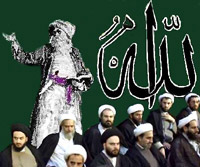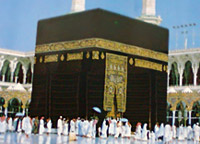 Prophet Muhammad is the great Prophet of Allah to whom the great revelation was given. Muhammad is the greatest among the various prophets of Islam, and is believed by many to be the last prophet. The revelation of God`s glory and his message for mankind was made to the Prophet through the angel Gabriel. Following this, he took up the task of spreading the word of God to the people and giving them His message about the Day of Judgment. The revelations of Muhammad are held by Muslkims to be the word of God, and the entire religion of Islam is based around these revelations.
Prophet Muhammad is the great Prophet of Allah to whom the great revelation was given. Muhammad is the greatest among the various prophets of Islam, and is believed by many to be the last prophet. The revelation of God`s glory and his message for mankind was made to the Prophet through the angel Gabriel. Following this, he took up the task of spreading the word of God to the people and giving them His message about the Day of Judgment. The revelations of Muhammad are held by Muslkims to be the word of God, and the entire religion of Islam is based around these revelations.
Early Life of Prophet Muhammad
Born to Abdullah ibn Abdul-Muttalib, Muhammad initially adopted the occupation of a merchant. He belonged to one of the minor families of Quraish. This probably means that he grew up familiar with the shady side of life in a holy city which was probably as bad as other holy places. The Islamic sources indicate that he was a charismatic person known for his integrity. In his youth he was known as "Al-Amin", a common Arab name, meaning "faithful, trustworthy" and was even sought out as an impartial arbitrator. Muhammad often retreated to a cave on a mountain outside Mecca called Hira for contemplation.
Preaching of Prophet Muhammad
In the year 610, when Muhammad was about forty, he said the Angel Gabriel commanded him to recite verses sent by God. These revelations continued for the next twenty-three years, until his death. The collection of these verses is known as the Holy Quran. The method of revelation is imagined as mechanical. The divine message was brought by the archangel Gabriel, who is called the Holy Spirit, to the Prophet who repeated what he had heard. The orthodox belief is that every word in the Quran was dictated by God, written by the `pen` on the `preserved tablet` and revealed to Muhammad as circumstances demanded.
He expanded his mission as a prophet, publicly preaching strict monotheism and warning of a Day of Judgment when all humans shall be held responsible for their deeds. He did not wholly reject Judaism and Christianity, two other monotheistic faiths known to the Arabs, but said that he had been sent by God in order to complete and perfect those teachings. When the call came to him, he was impelled to preach the terrors of the last judgment with the rewards and penalties of the future life. With this was combined emphasis on the supremacy of the one God, the creator. Reverence for the Lord of the worlds soon grew into an attack on all who had usurped His power, the local deities of the Arabs. At this stage in his teaching, the whole duty of man lay in believing God`s message and helping the poor and weak. Frequent prayers, especially at night, honesty in business are commended, and the burying alive of girl babies is condemned.
Muhammad preached that God is separate from the world He has made for "nothing is like Him" yet Muhammad is never tired of using the wonders of creation and birth to prove that He is and does not abandon those who trust in Him. He has all power so man must bow before Him in humility and accept what He sends. Hence the name Islam, an infinitive meaning `surrender` and Muslim, the active participle from the same root. The acceptance of Islam blots out a man`s past. He starts life afresh and any sins he may have committed are no more reckoned against him.
 Many in Mecca resented his preaching and persecuted him and his followers. His preaching made little progress among the business men of Mecca. To drive his message home Muhammad told stories of prophets of olden times- they had all seen their message rejected and disaster fell on those who had refused to listen. Mecca was not impressed. Eventually, in 622, he was forced to move out of Mecca in a journey known to Muslims as the Hijra (the Migration). He settled in the area of Yathrib (now known as Medina) with his followers, where he was the leader of the first avowedly Muslim community.
Many in Mecca resented his preaching and persecuted him and his followers. His preaching made little progress among the business men of Mecca. To drive his message home Muhammad told stories of prophets of olden times- they had all seen their message rejected and disaster fell on those who had refused to listen. Mecca was not impressed. Eventually, in 622, he was forced to move out of Mecca in a journey known to Muslims as the Hijra (the Migration). He settled in the area of Yathrib (now known as Medina) with his followers, where he was the leader of the first avowedly Muslim community.
The Meccans started attacking Medina. Even though the attacking armies were several times stronger in numbers and in weaponry, Muslims defeated these invaders every time they attacked. Muslims finally took back Mecca under the leadership of Muhammad after eight years of exile and took control of the city. Muhammad shed not a single drop of blood in the process of taking over Mecca. The Muslims subsequently removed all pre-Muslim religious objects, which they considered idols, from the Kaaba. Most of the townspeople accepted Islam. Deputations began to come in from other Arabian tribes. The conditions for their adherence were: the acceptance of Islam, the destruction of all idols and the payment of the `zakat` (tax) for the support of the poor community.
The Muslim state was born along with the religion in this period of Muhammad`s life. He was at once prophet and ruler so Islam cannot be divided into church and state. The infant state grew up in the midst of strife so war for the sake of God and religion was a duty. God`s command is, "Fight for the cause of God", "Be not fainthearted then; and invite not the infidels to peace when ye have the upper hand: for God is with you". Laws were laid down and previous customs ruled unless they conflicted with Islam.
In March 632, Muhammad led the pilgrimage known as the Hajj. On returning to Medina he fell ill and died after a few days, on June 8.
Islam after Prophet Muhammad
Under the Caliphs who assumed authority after his death, the Islamic empire expanded into Palestine, Syria, Mesopotamia, Persia, Egypt, North Africa, much of the Iberian Peninsula, and Anatolia. Later conquests, commercial contact between Muslims and non-Muslims, and missionary activity spread Islam over much of the Eastern Hemisphere, including China and Southeast Asia.









